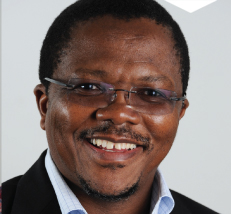 DEAN’S REPORT
DEAN’S REPORT
Professor Sakhela Buhlungu
One of the most gratifying aspects of the research activities in the Faculty of Humanities is the fact that they are spread out among the different categories and levels of academic staff: young and old, junior and senior, and women and men.
The impressive range of research in the Faculty of Humanities is a tribute to the heads of the various sections, departments and schools, who take care to support and encourage colleagues to engage in research. Below are brief summaries of some of the key achievements in 2013/14. These are mere illustrations and should by no means be read to represent the full spectrum of research activities in the faculty.
In 2013, Professor Carolyn Hamilton’s DST/NRF SARChI Chair in Archive and Public Culture was renewed for a further five years. Based in the School of African and Gender Studies, Anthropology and Linguistics (AXL), the chair has become one of the key research hubs in the faculty, bringing together senior and younger scholars, as well as international collaborators. The chair has started a new project to study the Southern African pre-colonial past. This has several dimensions, one of which is the Five Hundred Year Archive Project, which involves collaborations with the Killie Campbell Africana Museum, the University of KwaZulu-Natal (UKZN), the KwaZulu-Natal Museum, the Johannesburg Art Gallery, Historical Papers at the University of the Witwatersrand, the British Museum, the Phonogramm Archiv Berlin, and the Museum of Anthropology and Archaeology in Cambridge, United Kingdom.
Associate Professor Shamil Jeppie’s ongoing Tombouctou Manuscript Project saw the Institute for Humanities in Africa (HUMA) co-host an international conference on “The Arts and Crafts of Literacy: Manuscript cultures in Muslim, Sub-Saharan Africa” in September 2013. The project has become a catalyst for collaborative research between UCT and researchers in West Africa and the Sahel region.
Among new research activities embarked on by members of the faculty was a two-year project begun by Dr Siona O’Connell of the Michaelis School of Fine Art on the “Miss Spring Queen” and “Miss Gay Western Cape” pageants. Dr O’Connell is a joint leader of the project, alongside colleagues from the Royal Holloway University of London and the Queen Mary University of London. The project is funded through the UK Arts and Heritage Council, and follows an earlier research project, also led by Dr O’Connell, at the Centre for Curating the Archive. One of the main outcomes of this project will be the development of a digital archive.
African Textualities: Mobilities, Translations, Frames is a new collaborative research grouping which was established in 2014 and is based in the Department of English Language and Literature. Associate Professor Meg Samuelson is leading the project and the UCT team members are Dr Victoria Collis-Buthelezi, Associate Professor Harry Garuba, Dr Chris Ouma and Dr Sandra Young. The collaborative project is funded by a grant from UCT’s Programme for the Enhancement of Research Capacity and involves colleagues from Kenyatta University (Kenya), Makerere University (Uganda) and the University of Ibadan (Nigeria). There are plans to involve researchers from the Open University of Zimbabwe and the universities of Pretoria, Stellenbosch, the Western Cape, the Witwatersrand, and Rhodes University. The long-term objective of the project is to forge a continent-wide research network in literary and cultural studies.
Academics in the faculty attracted substantial amounts of research funds during 2013. Although significant amounts came from local sources, principally the National Research Foundation (NRF) and sources such as the National Lottery and the South African National Arts Council, the bulk of research funding came from outside, including international foundations and donors.
A strong emphasis on collaborative research is exemplified in the work of Professor David Chidester in Religious Studies, who has collaborated for five years with the research network Heritage Dynamics: The Politics of Authentication and the Aesthetics of Persuasion, which links colleagues in Amsterdam, Cape Town, Ghana and Brazil.
Also in Religious Studies, Associate Professor Sa’diyya Shaikh is leading a collaborative interdisciplinary research project titled Theorising Experience, Subjectivity and Narrative in Studies of Gender and Islam, in collaboration with Associate Professor Gabeba Baderoon (Penn State University) and Dr Nina Hoel (UKZN). In 2013, Associate Professor Shaikh organised an international conference at UCT on this project and co-edited a special issue of the Journal for Islamic Studies (2013).
Professor Bob Mattes from the Political Studies Department heads the Afrobarometer, a consortium that conducts survey research on public attitudes to the social, political and economic atmosphere in Africa based on nationally representative samples. The latest 34-country results represent the views of approximately three-quarters of the continent’s population. In October 2013, Afrobarometer published a policy brief titled After a Decade of Growth in Africa, Little Change in Poverty at the Grassroots (Mattes, together with Boniface Dulani and Carolyn Logan).
Some of the research activities in the faculty have a strong public-service dimension, with regard to modes of dissemination and public engagement. During 2013 and early 2014, many researchers, often working with community organisations, movements and non-governmental organisations (NGOs), took their research to communities in the greater Cape Town area. For example, in February 2013, Dr Zethu Matebeni of HUMA partnered with lesbian, gay, bi-sexual, transgender and intersex (LGBTI) organisations in Cape Town and hosted an evening symposium on the politics and contestations of gay pride and city space in South Africa. The symposium took place in a community centre in Langa.
In the same year, HUMA hosted a public lecture on the history of the 1913 Land Act. The lecture was part of HUMA’s public lecture/seminar series “Know Your City”, a long-standing initiative that is intended as a public history programme aimed at bringing academic experts into conversation with interested members of the public – particularly those resident on the Cape Flats. This series is organised in partnership with a local NGO, the International Labour Research and Information Group (ILRIG), which is well connected to the NGO community, including those on the Cape Flats. In 2013/14 the Gordon Institute for Performing and Creative Arts (GIPCA) ran a highly successful series of festivals titled “Infecting the City” in Cape Town (March 2013) and Mbombela in Mpumalanga province (January 2014) (see more).
Members of the faculty won numerous awards, prizes and other honours in recognition of their excellent work in scholarship, performance and creative work in the past year.
The faculty also continued to play its role as one of the leading centres for training postgraduate students in the humanities, the social sciences, and the performing and creative arts. A total of 109 master’s and 19 doctoral candidates graduated from the faculty in 2013. In addition, the faculty was host to 33 postdoctoral fellows.
A sample of achievements across the faculty
- In 2013, Dr Shose Kessi (Department of Psychology) was awarded the Harvard Mandela-Mellon Fellowship (tenable to May 2014).
- Professor Mark Solms (Department of Psychology) received an AW Mellon Foundation award to develop an interactive website for distance-learning purposes. Titled “Talking Head”, the award is worth US$250 000 and is for the period 2013 to 2015.
- Associate Professor Imraan Coovadia (Department of English Language and Literature) won the South African Literary Award for Creative Non-fiction for his 2013 essay collection Transformations. He also won the M-Net Prize for English Fiction for his novel The Institute for Taxi Poetry (2013).
- Professor Pippa Skotnes (Michaelis School of Fine Art) was awarded a year-long fellowship at the prestigious Wissenschaftskolleg in Berlin (Institute for Advanced Study) for 2013/14.
- In February 2014, Associate Professor Ana Deumert (Linguistics, AXL) received the Neville Alexander Award for the Promotion of Multilingualism from the Western Cape Government.


